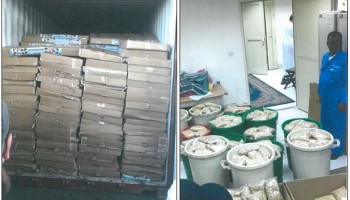Over a hundred experts gathered from 80 countries to discuss the protection of cultural property during conflict. They focused on how art theft can contribute to financing terrorism and what needs to be done to curb the use of cultural property by criminal organizations. The agency is seeking to decrease the stealing of cultural property by helping countries increase their capacities, Interpol said in a statement.
Transnational crime groups often see art theft as a low-risk, high-profit endeavor, the agency said while urging countries to develop specialized units to investigate such crimes.
“The global nature of cultural heritage theft, and its growing connection with transnational organized crime groups, requires a multi-sector, multi-region approach,” Interpol said.
The agency demonstrated to attendees how their stolen works of art database could help identify crimes and how the agency’s training could improve investigations into art theft and other associated illegal activities.
Attendees also discussed best practices concerning forgeries and finding counterfeit work, again with the focus on collaboration between countries but also police, the art world, and universities.
“With stolen works of art fast becoming as lucrative as drugs, weapons and counterfeit goods trafficking, the crime area is increasingly attractive for organized crime groups,” Interpol’s Works of Art Unit coordinator, Corrado Catesi, said.
“The illicit traffic of cultural property is a transnational crime that affects every single country on the planet – either as a source, transit or destination,” explained Catesi.
The symposium is part of a push by Interpol to crack down on art theft around the world. In August, a similar conference was held in South Africa with similar goals.
Al-Nusrah Front, ISIS, and other terrorist groups have notoriously taken artifacts from various Middle Eastern countries and regions. Not much is known about the smuggling routes these groups take. ISIS was rumored to rely on trafficking artifacts as its second main source of income for its operations, according to United States legislators.






